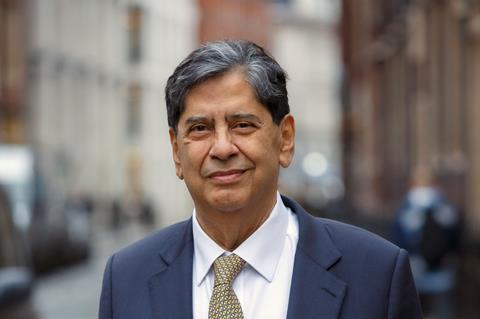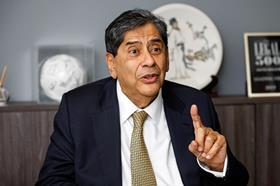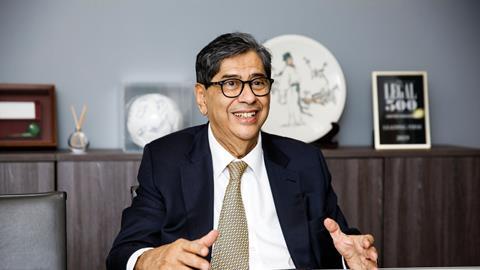BIOG
BORN: Bombay (now Mumbai)
EDUCATION: Jesuit school, commerce and economics college, Government Law College (all in Bombay)
ROLES: Admitted as a solicitor in 1978Founded Zaiwalla & Co in 1982
KNOWN FOR: First Indian national to found a law firm in the City of London
City solicitor Sarosh Zaiwalla’s contacts book must read like a Who’s Who of many of the major diplomatic and political players of the last 40 years. He advised the Dalai Lama and is a confidant of former UN secretary-general Ban Ki-moon. While still a student, he met Indian prime minister Indira Gandhi. He worked behind the scenes with the government of Saddam Hussein in an attempt to avert the second Gulf War. During John Major’s tenure, Zaiwalla organised the first ever Asian dinner at 10 Downing Street. He inadvertently sent junior barrister and future prime minister Tony Blair sprawling on his back. And, outside diplomatic and political circles, he is a friend (and neighbour) of former WBO middleweight and super-middleweight boxing champion Chris Eubank.
His work as a lawyer has been trail-blazing. In 1982 he became the first Indian national to found a law firm – Zaiwalla & Co – in the City of London. He then acted on more than 1,200 international energy, maritime and construction arbitrations globally, in the process exporting millions of pounds in legal services. He also acted on a case where his client had been accorded the status of God. He has won many prestigious awards. And in the midst of all this, he penned his autobiography, Honour Bound, published in January.
Zaiwalla’s childhood was spent in Bombay (Mumbai since 1995), the son of ‘possibly the first Indian to qualify, in 1924, as a lawyer in London’. He was educated at St Xavier’s, a Jesuit school where ‘the only subject which really engaged me – apart from cricket – was politics. I was always a bit of a revolutionary. I wanted to change the world and make it more egalitarian’.
After school Zaiwalla initially opted to train as a chartered accountant at a local commerce and economics college but, like his brothers before him, decided instead to enrol at Bombay’s Government Law College. ‘By then,’ he says, ‘I was a committed student activist, which soon gained me notoriety. One of Bombay’s evening newspapers began to call me a communist.’ He was not a communist, he protests, not least because of his ‘firm belief’ in God. ‘But I was certainly politically active and wanted to change India, to make it a modern country which uplifted and looked after its poor citizens.’ It was this commitment that led to him being introduced to Indira Gandhi at a student conference.
I was a committed student activist, which soon gained me notoriety. One of Bombay’s evening newspapers began to call me a communist
After graduation Zaiwalla moved to London, as his father had done half a century earlier. He arrived in January 1975 with just £60 to his name. Bhagwan Hiranandani, the London-based solicitor who – ‘on paper at least’ – had sponsored Zaiwalla’s move, was quick to offer him a job at £14 per week. This helped fund him through the Law Society finals and be admitted as a solicitor in July 1978. He was now poised to carve out a successful career in the law and, he recalls, ‘in April 1982, fulfilled my dream of being the first Indian to start an English firm of solicitors in the City of London’.
Zaiwalla & Co grew steadily, although it has to be said not without lucky breaks. For instance, Zaiwalla recounts, the then chief justice of India, Y.V. Chandrachud, agreed ‘formally to open my firm’s new offices’, a signal honour for a startup. On top of that, just before Chandrachud’s UK visit, the firm was appointed solicitors to the Indian High Commission in London.
It was not all plain sailing. The Indian High Commissioner who appointed Zaiwalla & Co encouraged him to visit India more frequently to seek business. This he did, usually going to Delhi, but it was a hard grind. ‘I would travel economy, stay in cheap hotels and start contacting people as soon as I arrived. It was a very basic process. I would simply go through the phone book, calling various business houses involved in shipping and international trade and say: “I am from London and would like to meet you.”’ The cold-calling paid dividends and Zaiwalla began to build a client base that over the years grew to embrace clients with interests worldwide.
With more than 1,200 international arbitrations to choose from, the Gazette arbitrarily begins with the high-profile case of Bank Mellat of Iran and the UK Supreme Court’s finding against the UK government.

Citizen of the world
In May 2004 the Dalai Lama asked Sarosh Zaiwalla ‘to facilitate a dialogue between him and China to find a peaceful resolution to the question of Tibet’.
Tibet was incorporated into the People’s Republic of China in 1950, and the Dalai Lama fled into exile in India during the 1959 rebellion. China stands accused of widespread human rights abuses in Tibet and has destroyed much of the country’s spiritual identity.
Zaiwalla says: ‘I was impressed by the strength of the Dalai Lama’s honesty. He said that he just wanted to return to his community and denied that Tibet was intent upon claiming half of China, as the Chinese state claims. I reported this back to the Chinese ambassador to London, who reminded me that the republic allowed freedom of religion, so long as that religion was not administered by a body outside China.’
To date, there has been no sign of China relaxing its grip on Tibet.
In October 2007, UN secretary general Ban Ki-moon invited Zaiwalla for a one-to-one consultation on world order. This was central to Ban’s new multilateralism, a programme with an ambitious agenda to unite nations in tackling a host of destabilising threats – such as nuclear proliferation, climate change and the global financial crisis.
‘We talked about what really matters,’ Zaiwalla says. ‘That’s the colour of the heart, not the colour of your skin or flag. I consider myself a citizen of the world, a national of Britain and a native of India.’
In 2009, HM Treasury alleged that Bank Mellat was helping finance Iran’s nuclear proliferation programme. The government, at great cost to the bank, imposed sanctions banning it from operating in the UK. The bank responded by claiming that it had done everything it could to sever links with companies designated by the United Nations to have a connection to Iran’s nuclear programme. A legal battle ensued, with the bank losing to the Treasury first in the High Court and then again in the Court of Appeal.
Zaiwalla & Co became involved at this juncture, taking the case to the Supreme Court in 2013. The Treasury argued that the court should go into secret session to consider sensitive intelligence it had acquired proving that the bank was participating in Iran’s nuclear programme. This was the first time the Supreme Court had been asked to hold a hearing – a closed material procedure (CMP) – behind closed doors.
Zaiwalla takes up the story: ‘The bank’s chairman said that Britain was supposed to be a beacon of justice to the world, and yet the UK government was proposing to use a CMP from which he would be excluded. How could he defend the bank when he didn’t even know the allegations against it?
‘In my statement to the press, I agreed that sanctions are an important way to enforce international law in a peaceful manner, but stressed that they must be subject to the rule of law and require evidence. It is vital for public confidence in the law that justice is not only done, but is seen to be done.’
The Supreme Court reluctantly agreed to the CMP, but found that there was nothing in the secret intelligence which might have affected its reasoning in the case. Accordingly, the court found in favour of Bank Mellat.

‘It was a victory for the rule of law,’ states Zaiwalla. ‘Six of nine Supreme Court judges had the courage to say that the government of their own country had acted unlawfully – and that says a lot about the independence of our judges.’ The government is believed to have paid the bank £1.25bn compensation in October 2019.
Another of Zaiwalla’s cases verged on the surreal. In the mid-1980s, he was tasked with returning no less a figure than God from London to the Indian temple from which the deity had been smuggled years previously.
This extraordinary commission concerned an idol of Nataraja who, among Hindus in India, represents Siva, the almighty God. The idol, which had been buried for several hundred years, was unearthed by a farmer who lived near a ruined Hindu temple in Tamil Nadu. The farmer sold the idol to a dealer in religious objects and it eventually found its way to London via Nepal.
Canadian company Bumper Development Corporation (BDC) bought the idol, in good faith, from an auction house in London in June 1982. Upon submitting it to the British Museum for appraisal and conservation, however, it was seized by the London Metropolitan Police in compliance with the UK government’s policy of returning looted religious artefacts to their owners.
BDC sued the Metropolitan Police for the idol’s return, the case being heard in the Court of Appeal in February 1991.
The challenge for Zaiwalla was seemingly insurmountable. How do you prove ownership of something that had lain buried for hundreds of years before being dug up by the landowner? And further, how do you prove that what BDC had bought at a legitimate auction had been stolen?
I would travel economy [to Delhi], stay in cheap hotels and start contacting people as soon as I arrived. I would simply go through the phone book, calling businesses involved in shipping and international trade and say: ‘I am from London and would like to meet you’
Zaiwalla saw a way of circumventing the proof of title and theft. Under Indian law a temple was a juristic personality – a non-living entity which nonetheless is regarded by law to have the status of a person. The ruined temple in Tamil Nadu was a representative of the idol and therefore, Zaiwalla argued, it must follow that the idol itself should also be recognised as a juristic personality. As such, the idol himself could tell the court that he wanted go back home to India, obviating the need to provide proof of title or that a theft had taken place.
After a 55-day trial, Nataraja’s wish to return home was granted.
By way of a postscript to the Nataraja case, the Egyptian and Greek governments subsequently contacted Zaiwalla for help in retrieving Pharaonic artefacts and the Elgin Marbles. He was unable to assist because neither the artefacts nor the marbles had the status of a deity.
Zaiwalla’s 45-year career to date and the number of international arbitrations mean that only the surface of what he has achieved as an Indian lawyer in London can be adequately discussed. For example, he acted in the case of former Russian oil giant Yukos, when the Russian state refused to honour a 2014 European Court of Human Rights ruling that it should pay £1.6bn in damages to shareholders. Also, the court of the International Chamber of Commerce appointed him sole arbitrator to determine a multi-million-dollar dispute between a Japanese multinational and an Indonesian company concerning the construction of water pipelines in Malaysia. And he was appointed to a panel of arbitrators in another multi-million-dollar dispute, between a Gulf state-owned satellite agency and a Lebanese television company.
‘We’re always going overseas to find work,’ explains Zaiwalla. ‘We do not have much of a local practice.’
So how did Zaiwalla send Tony Blair sprawling on his back and what is the Chris Eubank connection? The answer to the first question is a bit of an anti-climax: ‘Tony Blair tripped over my briefcase while we were both checking into a hotel in New Orleans. Chris Eubank, on the other hand, was impressed that, as a brown-skinned man, I had succeeded in starting my own firm in the city of London. He told me: “You are like me. You did it.”’
































2 Readers' comments